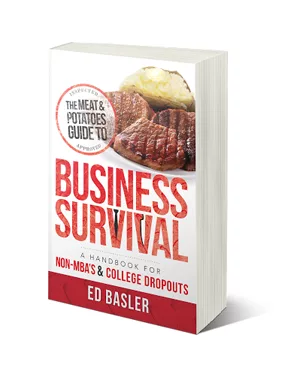
Ed Basler is a veteran entrepreneur who understands that without a degree, some human-resource managers might pass him over in favor of a more educated competitor. And he thinks that is a mistake for all parties.

“After four weeks of business school I, the son of a businessman, had realized that the professor had no real-life experience running a business and that I wouldn’t learn the practical principles necessary to succeed,” Basler said. “But I stuck with business school for two years until I dropped out, and I haven’t had any regrets 40 years later. Hands-on experience trumps a degree all the time.”
Basler is a longtime entrepreneur and CEO of E.J. Basler Co. in Illinois, which provides precision-machined parts and solutions to companies worldwide. He is a motivational speaker and president of Fresh Eyes Coaching, a firm that helps small businesses identify profit opportunities and obstacles. He is the author of “The Meat & Potatoes Guide to Business Survival: A Handbook for Non-MBA’s & College Dropouts.”
Business owners and hiring managers should see past the college degrees of potential employees, or lack thereof, and focus on the content of an applicant’s skills and character, says Basler, who offers, in his own words, the following tips for hiring.
• Do not accept any bad attitudes. A bad attitude spreads like the flu, and if you don’t stop it, it’ll make your whole team sick. Good attitudes will spread too, so look to hire people with a positive nature. Is the prospective hire full of complaints about previous employers? Don’t be surprised if you become the next target of such whining. No one is indispensable. I have interviewed people who were clearly bright and skilled. Yet, afterward, I felt like telling them not to let the door hit them on the way out. I’ve never regretted my decision to insist on good attitudes.
• Hire friends very cautiously. They can become your best employees. Often, however, they are your worst, and they’re hard to fire. Hire family members even more cautiously. Let them know the ground rules and expectations up front. And treat them like the rest of your employees. I hear horror stories all the time from business people who are suffering because of family involvement. But it can also work very well – it has worked out well for me.
 • Hire not only for skills but also for potential. Leaders can be made if trained and motivated properly. I’ve seen many a young person with no previous experience or knowledge of my business learn a trade or skill and prosper and excel. Many times, it’s even an advantage to start from the beginning with someone who does not have the baggage of bad habits or practices from a previous employer.
• Hire not only for skills but also for potential. Leaders can be made if trained and motivated properly. I’ve seen many a young person with no previous experience or knowledge of my business learn a trade or skill and prosper and excel. Many times, it’s even an advantage to start from the beginning with someone who does not have the baggage of bad habits or practices from a previous employer.
• Put people in the right positions. Test them for their personality and skill sets. There are many tests – one good one is the Meyers Briggs and the DISC profile. It’s hard, sometimes, to understand where people fit, which is why we try to use testing to learn about their particular skills.
“A college degree is a generic qualification and is by no means the ultimate criteria by which you should hire talent,” Basler says.



